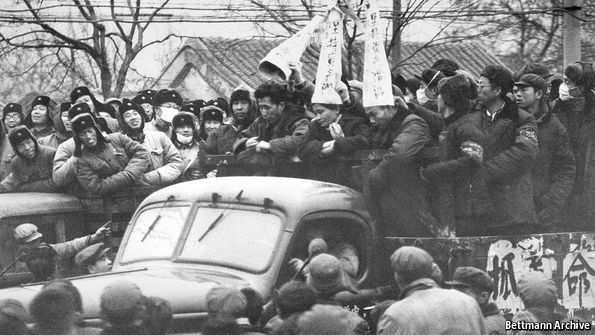
According to a report by "The Economist", the Cultural Revolution in China began on 1966 May 16. There was extreme violence by Chinese against Chinese. In Wuhan, a teenager bragged that he killed 5 children in rival factions of the Red Guards. In Daxing, a group of such guards buried an old woman and her granddaughter alive. In Guangxi, the Chinese ate their victims.
Why did the Chinese commit such atrocities?
The answer lies in Chinese culture, which has an ugly, savage dimension. Consider a Chinese who is living well. He has relatively much wealth, good health, and good prospects for the future. If his neighbor is brutalized and ultimately killed, then the Chinese thinks, "His suffering is none of my business. I am doing fine. My status is the only thing that matters."
This barbaric indifference in Chinese culture explains the Cultural Revolution and, moreover, is the reason that human rights and democracy do not gain traction in China.
Furthermore, according to another report by "The Economist", Harry Wu (also known as Wu Hongda) suffered brutally during the Cultural Revolution. Beijing imprisoned him in the gulag for about 19 years. He became so malnourished that, one day, "he found a tangle of hibernating snakes, pulled them out, bit off their heads, skinned them and boiled them up for that wonderful, near-forgotten taste of meat." After his release from prison, he waged a campaign of highlighting human-rights abuses in China. Most Chinese (including Chinese living in the West) ignored him.
You can verify this callous indifference (in Chinese culture) by merely attending a meeting of your local chapter of Amnesty International (AI) at a nearby university. Although the percentage of ethnic Chinese in the college of engineering exceeds 50%, the percentage in the meeting of AI is close to 0%.
Meetings of AI typically have attendees with a variety of ethnicities, but ethnic Chinese are rare.
Chinese morality savagely assaults Western notions of human decency.
note1. According to a report by "The Economist", "'China's weak ethics governance has made it an attractive destination for the export of unethical practices from the developed world,' she says. One high-profile case in China concerns Sergio Canavero, an Italian neurosurgeon who resigned from the University of Turin in 2015 because of fierce opposition to his plan to perform head transplants on human beings. Knowing that no country in Europe or North America would approve such procedures, Dr Canavero went to China, which he says 'is quite different from the West' and 'has a different ethics'."
6 comments:
Ever heard of tarred and feathered?
The poor writing skills and lack of reasoned argument of the author lead me to question his (or her) claimed academic credentials.
The percentage of 'ethnic Chinese' attending an Amnesty International meeting, has nothing to do with how Chinese PEOPLE view human rights. This article says more about you, than it does about Chinese people and Chinese culture.
'Western notions of human decency'? Hmmm. As in, American gun culture, which permeates through your society into mass shootings of innocent children in schools?
This is utter B.S. The author is either ignorant or trolling.
Most people on earth, regardless of their ethnic, national, and/or cultural background, are selfish. It's unfortunately the dark side of human nature. It takes luminaries like Gandi, Mandela, MLK to light the path for the rest of us, and they exist throughout the Chinese history.
Look no further than the famous verse, 先天下之忧而扰, 后天下之乐而乐
Mao killed over 100 million, Jinping is going for a billion
Amnesty International, as its actions in the Ukraine-Russia conflict have shown, is a compromised organisation whose existence is an insult to all human rights campaigners around the world. It is part of the left-wing 'long march through the institutions'. Using them as a benchmark is akin to using attendance at the high school chess club to identify current chess grandmasters.
I urge you to retract this post.
Post a Comment